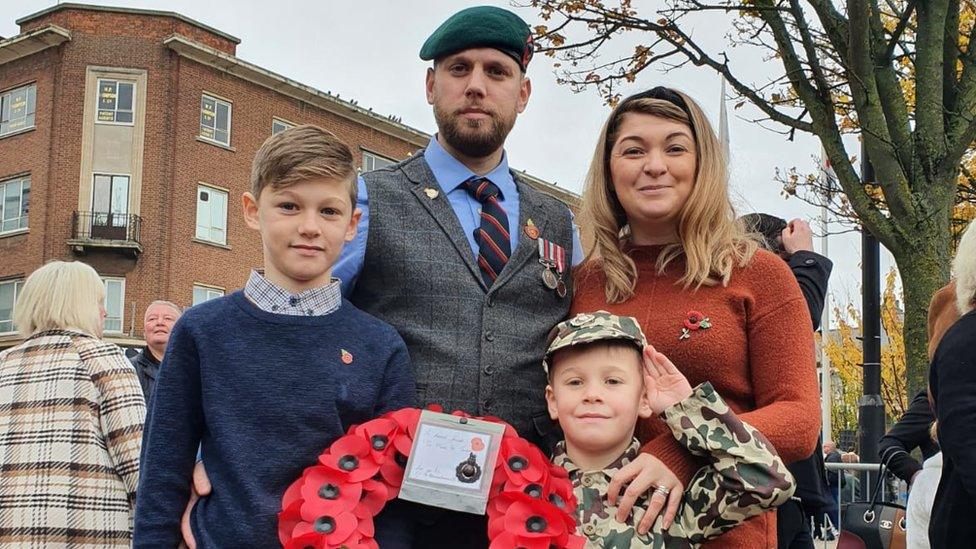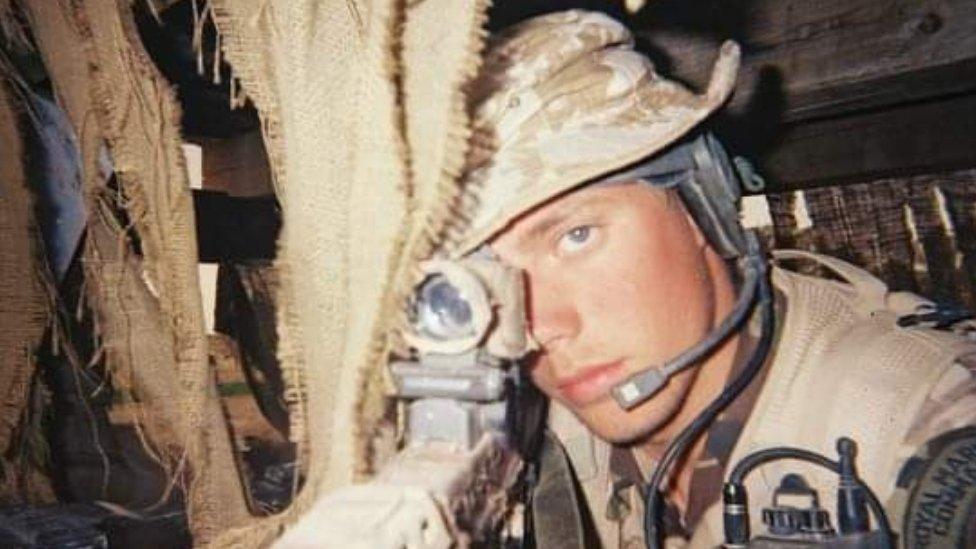Former Royal Marine urges traumatised veterans to get help
- Published

Mike Wrightson with wife Rebecca and their children
A former Royal Marine traumatised by fighting in Afghanistan is urging other veterans not to delay getting help.
Mike Wrightson, 34, from Hull, was diagnosed with post-traumatic stress disorder (PTSD) after leaving the military 10 years ago.
He admits he "bottled up" his emotions but wishes he had sought help earlier.
His plea comes as charity Combat Stress said increasing numbers of Afghanistan veterans were presenting with trauma after "struggling in silence".
Mr Wrightson said: "With PTSD, you do not realise, often until it's too late, that you have it. Your friends and family notice first. Listen to them. Get help. Don't wait until it's too late."
He was close by when a British Army soldier was mortally wounded in a grenade attack.
"We had quite a few casualties," said Mr Wrightson. "I was visiting a checkpoint close by when it happened. We assisted with the casualties. I grabbed my friend and got him to one of the medical wagons.
"I remember looking into the eyes of the medic, realising this was her first traumatic experience of the tour."

Mike Wrightson in action in Helmand Province, Afghanistan
Mr Wrightson left the military in 2012 and admits he "hit the bottle hard" and avoided confronting his deteriorating mental health.
"Looking back now, I was wrong not to seek help straightaway," he said. "I felt ashamed and I shouldn't have done."
Encouraged by his mother, Mr Wrightson saw a private specialist who diagnosed him with PTSD-related depression.
Mr Wrightson is using physical challenges to help him deal with his trauma.
On 3 June, he will set off on a 169-mile run from the Humber Bridge to Dovercourt in Essex, where a former comrade was last seen alive before his remains were found 10 months later in September 2021. Investigations continue into the circumstances around his death.
"The only way I have got through the last 10 years is by striving to be the best I can be," added Mr Wrightson.
He is fundraising for the Royal Marines Charity and Rock2Recovery.
Seeking help 'vital'
Dr Walter Busuttil, director of research at Combat Stress, said the earlier people received treatment, the less likely they were to develop more serious conditions.
"A small but significant number of those leaving the Armed Forces develop mental health problems, including PTSD, which can take some time to present," he said.
"We know there are many veterans who are still struggling in silence. It is vital they are encouraged to seek help."
UK combat operations in Afghanistan ceased in October 2014. A total of 457 British forces personnel or Ministry of Defence civilians died in the conflict which started started in October 2001 following the 9/11 attacks.
In 2019/2020, Afghanistan veterans made up 22% of the total number of people receiving care from Combat Stress. In 2020/2021, that figure had increased to 29%.

Follow BBC Yorkshire on Facebook, external, Twitter, external and Instagram, external. Send your story ideas to yorkslincs.news@bbc.co.uk or send video here.